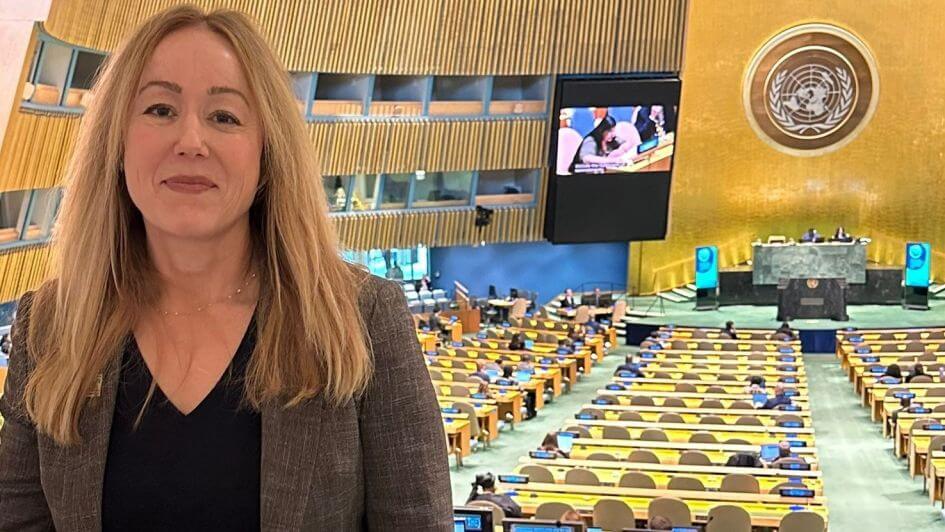On Friday, April 19, 2024, Kristina Skierka, CEO of Power for All, spoke at the United Nations General Assembly. Her address was part of the global stocktaking event, marking the end of the UN Decade of Sustainable Energy for All. The event aimed to accelerate the implementation of Sustainable Development Goal 7 (SDG 7) under the 2030 Agenda for Sustainable Development. In her speech, Skierka advocated for improved policy and financial frameworks to speed up the adoption of distributed renewable energy, highlighting its effectiveness in advancing SDG 7 and related goals. Here is the full transcript of her comments:
Ministers, representatives, and colleagues, thank you for the opportunity to participate in the global stocktake discussions. I particularly want to recognize the United Nations and the United Nations Department of Economic and Social Affairs, as well as the SDG 7 Technical Advisory Group, for their meaningful contributions to the global effort to achieve universal energy access.
My name is Kristina Skierka, and I am the founder and CEO of Power for All, a global campaign focused on ending energy poverty by accelerating the adoption of decentralized renewable energy (DRE). Power for All is a multi-stakeholder coalition of more than 500 partners worldwide across the energy access ecosystem. Together, we are successfully transforming how energy is used, generated, and financed.
As a result of our collective effort, the sector—including mini-grids, rooftop solar, and productive uses in various economies, particularly in agriculture—is now delivering energy to more customers than any global utility. DRE has become a significant source of benefits, notably supporting Sustainable Development Goal 8. According to our Powering Jobs Census, DRE is generating more jobs than several national utilities in the Global South, with these jobs proving to be more resilient and offering more opportunities than those in the traditional energy sector.
To address the questions posed by the UN for today's discussion on ambition, scale, and cooperation, it is crucial that we examine the systemic biases that limit these elements. In today's opening remarks, there was scant recognition of the role that companies play in connecting hundreds of millions of people to sustainable energy. Although some comments from the floor acknowledged public-private collaboration—I appreciate, in particular, the remarks from the CEO of Renew Power—the critical role of the private sector in achieving universal energy access was largely overlooked.
It is vital that we recognize that both indigenous and international companies working toward universal access face a maze of regulations and disincentives, rather than simplicity and access to the same subsidies afforded to traditional approaches to energy and electrification. I believe that decision-makers and funders, including those present here and elsewhere, can do much more to enable the private sector to end energy poverty more quickly. For example, member nations should include centralized renewables in national energy plans, along with strategies for adjacent sectors affected by energy, such as agricultural transformation plans that incorporate access targets and carve out roles for decentralized renewables.
Member states can also aid the growth of the DRE sector by establishing clear, consistent paths for the installation of decentralized renewables and mechanisms for DRE to eventually integrate with the centralized grid, if that is how the market develops. Clear and consistent regulations for renewables are positively correlated with sector growth, and we cannot shy away from discussing subsidies, especially when acknowledging that DRE consistently outperforms traditional centralized generation in various areas, including the pace and reliability of connections.
Finally, at the global level, foundations, banks, and investors need to mobilize their resources. Between 2012 and 2019, donors committed a total of $1.6 billion to help scale the mini-grid sector in Africa, yet only 13% of that funding has been disbursed. It is imperative to ask whether it makes sense to maintain an uneven playing field that disincentivizes access and renewables when we need all hands on deck to tackle the most pressing issues of our time. Leveling this playing field will drive ambition, scale, cooperation, and help us achieve Power for All.
Thank you.
